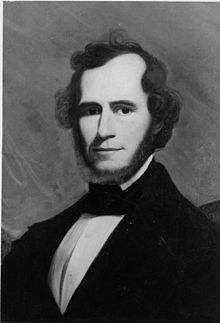Thomas Watkins Ligon
| Thomas Watkins Ligon | |
|---|---|
 |
|
| 30th Governor of Maryland | |
|
In office January 11, 1854 – January 13, 1858 |
|
| Preceded by | Enoch Louis Lowe |
| Succeeded by | Thomas H. Hicks |
| Member of the U.S. House of Representatives from Maryland's 3rd district |
|
|
In office March 4, 1845 – March 3, 1849 |
|
| Preceded by | John Wethered |
| Succeeded by | Edward Hammond |
| Member of the Maryland House of Delegates | |
|
In office 1843–1845 |
|
| Personal details | |
| Born |
May 10, 1810 Farmville, Virginia, US |
| Died | January 12, 1881 (aged 70) Howard County, Maryland, US |
| Political party | Democratic |
| Spouse(s) |
Sally Ann Dorsey (m. 1840, her death) Mary Tolly Dorsey (m. 1840–1881, (his death) |
| Alma mater |
Hampden–Sydney College University of Virginia Yale Law School |
Sally Ann Dorsey (m. 1840, her death)
Thomas Watkins Ligon (May 10, 1810 – January 12, 1881), a Democrat, was the 30th Governor of Maryland in the United States from 1854 to 1858. He also a member of the United States House of Representatives, serving Maryland's third Congressional district from 1845 until 1849. He was the second Maryland governor born in Virginia and was a minority party governor, who faced bitter opposition from an openly hostile legislature.
Thomas Watkins Ligon he was born on May 10, 1810, near Farmville, Virginia, the son of Thomas D. Ligon and Martha Watkins. He graduated from Hampden–Sydney College, then entered the University of Virginia. He graduated from Yale Law School and returned to Virginia where he was admitted to the bar. In 1833, he moved to Baltimore, Maryland where he practiced law for the next 20 years. On September 29, 1840, he married Sally Ann Dorsey and made his home in Ellicott City, Maryland. Mrs. Ligon died shortly after their marriage and he married her sister, Mary Tolly Dorsey. He had one son and one daughter.
In 1843, he was elected to a seat in the Maryland House of Delegates from Howard County and in 1845, the Democrats nominated him for Congress. He defeated the incumbent John Wethered by a majority of about 1,000 votes, and was re-elected by a larger margin in 1847. He served in the Twenty-Ninth and Thirtieth Congresses, taking his seat on December 1, 1845 and retiring on March 3, 1849.
...
Wikipedia
